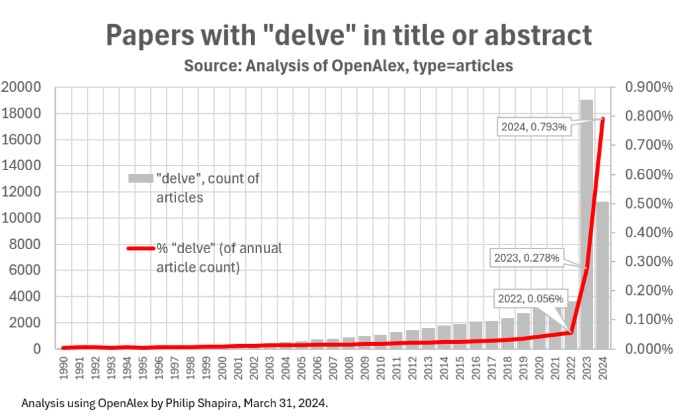5 stories that caught my eye this week (and last) and what I took away from them.
Will A.I. Boost Productivity? - The New York Times
Will A.I. Boost Productivity? Companies Sure Hope So. - The New York Times (nytimes.com)
A productivity boom is the most bullish global macro outcome of the AI advances.
Academic studies have found productivity benefits ranging from 9% to 56%. Companies like Klarna have described their experience. This article adds a collection of anecdotal evidence from early adopter companies.
Walmart uses an app designed to field HR queries and help provide HR services.
Macy's is exploring AI to customize marketing, including using generative AI for email content, online product descriptions, and replicating product images with different backgrounds.
Abercrombie & Fitch is using Midjourney in fashion design brainstorming and to draft descriptions for its website and app.
Wendy’s is experimenting with using AI to allow dynamic pricing on its digital menu boards.
Ben & Jerry's has deployed AI-enhanced cameras in supermarket ice cream freezers to keep tabs on the stock levels of popular flavours, sending alerts to distributors for restocks. Sales from freezers with the new cameras increased by 13%.
Deere introduced AI cameras that accurately spray herbicides by pinpointing weeds, which has been applied across 100 million acres, resulting in a conservation of 8 million gallons of herbicide in the first year.
Bottom line: Mounting evidence of a significant AI productivity boost from early adopters
Delving into “delve” – Philip Shapira
- Delving into “delve” – Philip Shapira
- How do you spot whether text is AI generated? It’s very difficult to be certain. Even the best software throws up a lot of false positives. So much so that OpenAI shut down access its tool to detect AI-written text.
- But maybe it’s as easy as looking for the word ‘delve’ in the introduction and abstract.
- The occurrence of ‘delve’ in the title or abstract of academic papers has skyrocketed since 2022, when ChatGPT was released.
- LLMs use the word ‘delve’ to sound more authoritative.
- Caveat: ‘delve’ only appears in 0.8% of papers, so this likely still far underestimates the use of LLMs.
- I’m happy to report that none of my newsletters have ever used the word ‘delve’. Though I’m not sure whether that says more about my vocabulary than my use of AI tools.
- Of course, now that this bias is receiving so much attention, it will naturally disappear. Academics will remove it and LLMs will be taught not to overuse it. An effect we know well from financial markets.
- Bottom line: Don’t use the word ‘delve’ or people will think you used ChatGPT to write your blog.

Do stock markets over-react to news events? – Bianchi et al
This paper measures the over- and under-reactions of equity markets to hundreds of economic news events. It’s not the first to do so, but they use a novel approach.
Main findings:
Contrary to conventional wisdom, they find that on average equities under-reacted to news events.
Big market moves after events tend to be over-reactions.
Equities over-react most to corporate earnings news and least to Fed news. Turns out equity investors are more impressed by micro than macro…not a surprise to this equity strategist.
In bear markets, over-reactions can be a source of market stability. This happens because the sum total of different individual overreactions to multiple shocks can dampen rather than amplify their combined market impact.
Caveat: the greatest uncertainty in the results is that it remains difficult (impossible?) to know what the unbiased market reaction to news would have been.
Bottom line: Equity investors over-react most to corporate earnings news and most big market moves on events are over-reactions. Someone should back-test this as a trading strategy.
Amazon kills “Just Walk Out” – arsTechnica
- Amazon Fresh kills “Just Walk Out” shopping tech—it never really worked | Ars Technica
- Amazon’s ‘Just Walk Out’ technology seemed like science fiction when it was first introduced in 2016. Just put your shopping in your bag, walk out and automatically be charged…wow!
- Now they are phasing it out from its large US grocery stores and replacing them with smart carts where customers scan products as they put them in their shopping cart. I’ve been doing this for years at Waitrose.
- Bottom line: Another example that real world AI, interacting in a human environment, is hard, just like autonomous vehicles.
Worldwide divergence of values – Jackson et al
Growing polarisation within countries has been one of the big macro trends over the past decade(s).
At the global level, the premise has been that national cultures and values would converge in an increasingly globalised world and with rising incomes. But has it really?
This paper looks at 40 years of survey data from 76 cultures and more than 400,000 people, measuring 40 specific values linked to openness, obedience and faith. Pretty comprehensive.
The main findings:
Cultural values have not converged globally. In fact, they have diverged.
But the divergence has not come from value moving in opposite directions, but rather from values broadly moving in the same direction, but at different speeds.
Values have become more similar within regions, but less similar between different regions.
My takeaway: Cultural divergence can play into how countries position themselves in a multipolar world. If the US-China decoupling continues, countries increasingly have to position themselves closer to one block or the other. Cultural similarities can play a big role in which side a country chooses.
Bottom line: Cultural divergence is a slow moving force against globalisation and makes a polarised world more likely.
